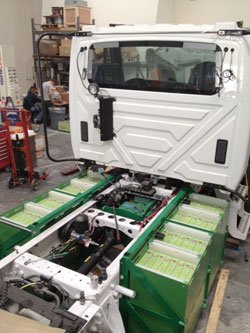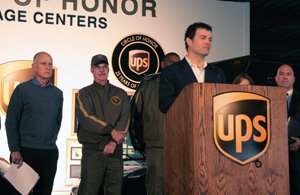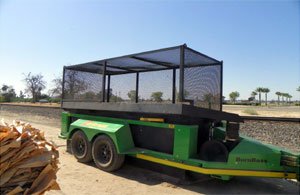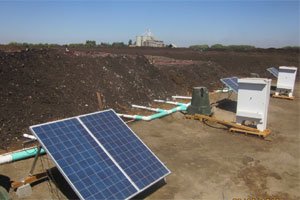California Clean Air Technology Initiative (CATI) Projects
EPA Pacific Southwest has provided funding to both the South Coast Air Quality Management District and the San Joaquin Valley Air Pollution Control District to help spur early-stage, innovative technologies that need further testing and demonstration prior to massive deployment and commercialization. Please note that the projects listed below are a subset of those funded and are not necessarily confirmed. Once finalized, these projects will reflect such.
- South Coast Air Quality Management District (AQMD) Technology Advancement
- San Joaquin Valley Air Pollution Control District
South Coast Air Quality Management District (AQMD) Technology Advancement
Hybrid Natural Gas-Electric and Fully Electric Class 8 Trucks

Class 8 truck in the lab.
This project will demonstrate different truck technologies with overhead catenary accessibility. One will utilize a battery electric drive system and the other will be a compressed natural gas-hybrid truck that incorporates an electric drive system on the chassis. This project will include the design, development and testing of new components that enable trucks using electric drive architecture to acquire and convert power from overhead catenary lines. While connected to the catenary system the truck will operate on wayside power while also recharging the batteries.
Zero Emission Heavy-Duty Electric Trucks
This project will develop and demonstrate heavy-duty battery electric trucks, as well as develop the manufacturing capability for the electric drive system in California. The initial focus will be on the drayage market where the low-range duty-cycle will match well with the operational restrictions of a large, all battery-electric vehicle. The electrification of transportation technologies has the potential to significantly reduce criteria pollutant and greenhouse gas emissions. This can provide substantial benefits to communities, neighborhoods, and school areas where these vehicles operate.
Zero- and Near-Zero Emission School Buses
This project, funded through the West Coast Collaborative, will remove old diesel school buses from the road and be replaced and/or repowered with fully-electric battery-powered and model year 2011 natural gas compliant engines.
Electric Delivery Trucks
Through the West Coast Collaborative, this project will remove at least 50 older on-highway medium heavy-duty diesel trucks and replace them with fully-electric, zero tailpipe emission battery-powered vehicles.
School Bus Air Filtration
This project will reduce ultra fine particulate matter by installing filters on school buses and measuring the cabin air participate concentrations with and without the filter systems. This proof-of-concept study will demonstrate particulate levels inside vehicles compared to outdoor road levels.
Completed: UPS Zero-Emission Electric Delivery Trucks
This project replaced 40 UPS delivery diesel trucks located in San Bernardino with zero-emission medium-duty trucks. The project was funded, in part, by the California Air Resources Board's Hybrid Truck and Bus Voucher Program (HVIP) launched to help businesses replace fleets with low carbon emitting hybrid and electric vehicles.
Completed: Air Filtration Systems in Schools and Community Centers
Air filtration systems were installed at schools and community centers in San Bernardino and Boyle Heights to reduce particulate matter and ultrafine particulates inside these buildings. These filters have emission removal efficiencies for up to 92% for ultrafine particulate matter and black carbon.
San Joaquin Valley Air Pollution Control District
The Technology Advancement Program (TAP) is the District's strategic approach to encouraging innovation and development of new emission reduction technologies. The TAP will consist of an ongoing review of new technology concepts, interagency partnerships, funding for technology advancement programs, and collaborations to build and expand local capacity for research and development in the San Joaquin Valley.
EPA Region 9 has supported the following subset of TAP projects:
Proposed Biogas Projects
Anaerobic Digester Facility for Natural Gas Pipeline Injection
This project proposes to develop and demonstrate a novel packaged hardware system for gas purification and injection into the natural gas pipeline in Tulare.
Wet-Scrubber Based After-Treatment Biogas System
The proposed system, located at a wastewater treatment facility in Bakersfield, has the potential to reduce NOx and other emissions from electricity generation projects at anaerobic digesters to levels lower than the current Best Available Control Technology, with far lower operating expenses than the currently used catalyst-based systems.
Proposed Mobile Source Vehicle Projects
Zero-Emission Electric Yard Tractor
This heavy-duty electric yard tractor would replace diesel rigs currently used to move trailers around a distribution facility in Lebec.
Hybrid CNG-Turbine Powered Range Extended Series Electric Truck
This project proposes to demonstrate a CNG-turbine powered range extended series electric truck in the Valley. The project seeks to demonstrate near-term commercialization and production capabilities in this class as well as illustrate the zero tailpipe emission pathway represented by electric-traction truck architecture proposed in this project. This technology has the potential of demonstrating near zero emissions technology in the goods movement sector.
Plug-in Hybrid Wheel Loader at a Dairy
This project will convert a wheel loader to plug-in hybrid operation, and identify fuel savings and emission reductions at a dairy. Hybrid electric technology, which has been available in the light-duty vehicle category in the past, is only recently being applied to off-road vehicles. This proposal will advance the transfer of this technology into this category, and serve to verify and quantify the emission reductions associated with the system.
Plug-in Electric Hybrid Propane Utility Work Truck
This project will demonstrate a plug-in electric-hybrid propane utility truck using a Ford F-250 truck base at a farm. The demonstration and testing will identify NOx emission reductions, greenhouse gas reductions, and fuel savings. The outcome of this proposal has the potential to affect a large segment of the on-road vehicle emissions inventory, in light of the extensive use of utility truck in agriculture and other industries.
AdvancedSeries Hydraulic Hybrid Refuse Vehicle
This project will demonstrate two new refuse vehicles fitted with an advanced series hydraulic hybrid-drive technology to reduce diesel fuel consumption, and associated NOx and other emissions, by up to 45%. The City of Manteca will purchase the trucks, monitor the vehicles and collect data from the hybrid truck and a conventional diesel truck, for comparison purposes.
Electric Autonomous Agricultural Spray Vehicle
This project will demonstrate the world's first zero-emission, completely autonomous agricultural spray vehicle at farms. Successful implementation of this technology could have a significant impact on the inventory of emissions from agricultural tractors, which are numerous in the Valley.
Other Proposed Projects
Solar Agriculture Irrigation Pumps
This project will demonstrate a renewable solar power generation system as an alternative option for remote diesel-powered agricultural irrigation pumping systems through the combination of a thermal solar concentration system with reciprocating steam engines and a pressurized steam storage system. While the applicability of the technology is focused on agricultural pumping engines, successful demonstration of the technology may prove a low cost thermal storage alternation for additional applications reducing the barrier to adoption of solar thermal technology.
Battery Electric Powered Leaf Blower
This zero-emission backpack leaf blower will use the most advanced battery and blower technology available designed for commercial use. The project will integrate the blower units into the daily institutional grounds maintenance schedules and demonstrate the technology will be capable of replacing high emitting gasoline powered leaf blowers in commercial lawn maintenance operations.
Completed Projects
Hydraulic Hybrid Vehicles Demonstration

EPA and the United Parcel Service (UPS) have developed a hydraulic hybrid delivery vehicle to explore and demonstrate the environmental benefits of the hydraulic hybrid for urban pick-up and delivery fleets.
UPS Zero-Emission Electric Delivery Trucks
This project replaced 50 UPS diesel trucks located throughout the San Joaquin Valley with zero-emission medium-duty trucks. This project was funded, in part, by the California Air Resources Board's Hybrid Truck and Bus Voucher Program (HVIP), launched to help businesses replace fleets with low carbon emitting hybrid and electric vehicles.
Low Emissions Alternative to Open Burning for Paper Raisin Trays during Grape Harvest

This project tested a mobile prototype device that lead to significant emission reductions resulting from the burning of paper raisin trays used during the grape harvest. The technology has been shown to significantly reduce visible smoke and particulate matter emissions compared to open burning. The unit proves to be a viable and cost effective alternative to burning paper trays and vineyard removal materials.
- Read the project report, Greenwaste Compost Site Emissions Reductions from Solar‐powered Aeration and Biofilter Layer (PDF)
Solar-Powered Aerated Static Pile Method of Composting

This project designed and tested an aerated static pile method of composting for a large-scale composting facility. Air emissions during the active composting phase were significantly reduced for total non-methane, VOCs, ammonia and NOx. The project also reduced the amount of fuel, water and land necessary for active-phase composting.
- Read Additional Information or the Final Report
Ultra-Low NOx Biogas Engine Selective Catalytic Reduction System
This project demonstrated an advanced compact selective catalytic reduction (SCR) device on a biogas powered engine at a dairy farm in Atwater. This system reduced emissions from biogas power generation systems to ultra low-NOx levels, or below the California Air Resources Board's 0.07 lb/MWH distributed generation standard.
- Read Additional Information or the Final Report
